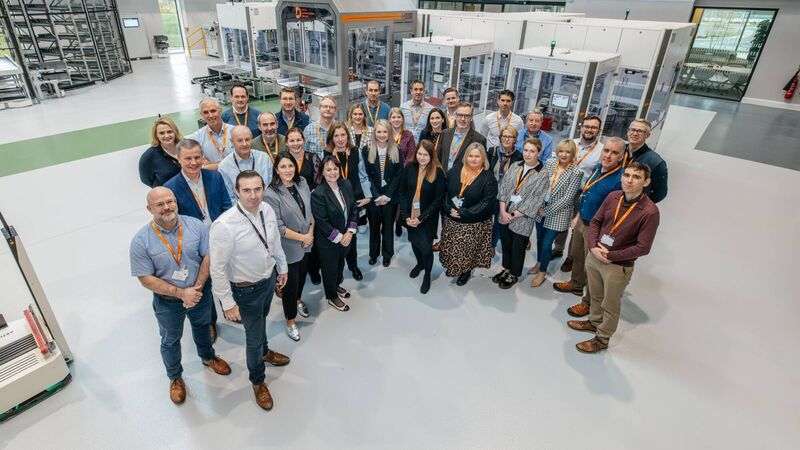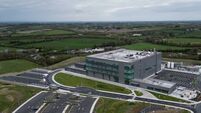Human-centric manufacturing – positioning Ireland at the forefront of digital transformation

Sara Cuddy with representatives of the eleven industry participants in Digital Manufacturing Ireland’s HCM study with MIT and IAAE. Picture: Sean Curtin
Human-Centric Manufacturing (HCM) is a mode of organisational leadership that focuses on the creation of manufacturing environments which prioritise the well-being and contribution of workers alongside the successful adoption of transformative digital technologies.
Taking into account the physical and emotional well-being of workers, HCM places people at the centre of the manufacturing process and in doing so, creates an environment that is conducive to integrating people and new technological solutions in a way that drive helps drives competitiveness.
Digital Manufacturing Ireland (DMI), based at the National Technology Park Limerick, is an industry-led national organisation designed to support manufacturers access and successfully adopt digital technologies that can drive their future competitiveness.
"The main focus for us is the practical implementation of technology, and a significant part of what we do is helping organisations to utilise that technology to serve the employee," explains Sara Cuddy, Director of People, Organisation & Transformation Culture at DMI.
"However, getting the most out of digital transformation requires securing a lot of support and buy-in, not just from the boardroom, but all the employees in the organisation. This is where HCM comes in. Every company is unique, and every site is unique, and we usually need to take a multi-pronged approach to bringing people with us when trying to transform the way a company does things."
Digital Manufacturing Ireland is responsible for transforming the manufacturing value chain through innovative technology across the integrated pillars of supply chain, operations and workforce transformatio

n.
The DMI vision seeks to position Irish manufacturing at the forefront of digital transformation and to ensure that Ireland is recognised internationally as having a vibrant and digitally enabled industry base, ideally suited to delivering the next generation of manufacturing.
"How we regard Human Centric Manufacturing is not as just another piece of change management — it is more of a cultural transformation aligning your enterprise strategy, your leadership values and your technology to enable that data-driven, people centred organisation. All of those components must come into play in order to arrive at a place of Human Centric Manufacturing culture."
As an accomplished HR strategist with a career track record in talent development and organisational design, Sara has extensive experience at deploying customer-centric programs and HR technologies to enhance business outcomes, including 10-years working in the Medtech sector in the United States.
"We believe that actually enabling this type of culture will accelerate your adoption and innovation - in addition to attracting and retaining top performers in digital transformation. Effectively, what you are doing is using digital technology as an enabler to more fulfilling roles for your organisation."
In its aim of assisting manufacturers engage with the potential of digital transformation, DMI initiated an industry-led research exercise involving eleven leading manufacturers and the expertise of Massachusetts Institute of Technology (MIT) and the International Academy of Automation Engineering.
This HCM report will be published this month, as a precursor to the launch of a national Centre of Excellence for Human-Centric Manufacturing this March.
In advance of the research being published, Sara was eager to focus on its purpose.
"The faster and more authentically you can recognise what is important to people, the faster you can build trust with them. But there is no one-size-fits-all for every organisation. You have to meet people where they are, and it comes down to how you communicate and engage with people. It is about what is important to the individual and getting to know them as 'whole people' and not just their work persona."
In her role guiding the people part of the change process, Sara underlines the idea that while technology is a huge enabler, it is ultimately only as effective as the degree to which people embrace it: "A big part of change management is elevating the role of 'recognition' and making sure that people feel seen and heard. There's no such thing as over-communication in these situations — and managers need to be able to understand everyone's concerns, not just those coming from the leadership team."
Embracing data-driven methodologies helps position manufacturing organisations to be more agile to market fluctuations, while improving gross margins, and gaining a competitive edge in an increasingly complex business landscape.
"It is really about bringing your workforce along on the journey, and helping put technology in their hands so that they can make decisions that help to make their lives easier. It is about changing thought processes about technology enablement, moving away from the perception of something that's scary to something that's going to help you on a daily basis."
With the pace of technological change in a constant forward motion, university graduates of today will need to upskill and retrain regularly throughout their working lives.
"We are at the start of a decades-long process that is going to redefine what we think of a workforce as being, and it is important to get ahead of that conversation."
If technology continues to advance at the pace it is now, successful companies will be those that are best able to adapt. "You have to put your people at the centre of everything you're doing, because they are your main asset and how you treat them is hugely important. It has always been about people, and it always will be."











